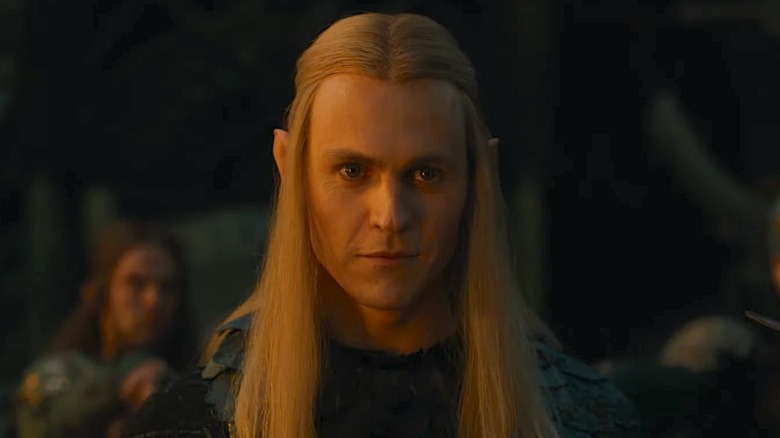The Real Reason Sauron Calls Himself An Envoy In LOTR: The Rings Of Power Season 2
Warning: This article contains spoilers for "The Rings of Power" season 2. Read at your own peril.
In episode 2 of "The Rings of Power" season 2, Sauron (Charlie Vickers) finally leaves his Halbrand persona (which was invented for the show) behind. While there is some reasoning behind the show's non-canonical mortal iteration of the Dark Lord, in my opinion, it's about time we move on to bigger, more book-accurate stuff. Instead of Halbrand, the show is resolving a Sauron-size plot hole by having the villain embrace his book-accurate role as Annatar, Lord of Gifts, to deceive Celebrimbor (Charles Edwards).
At the end of the episode, right before he sheds his mortal appearance, Sauron/Halbrand/Annatar says, "There are forces in this world beyond evil, Celebrimbor, and sometimes they send aid in the form of an envoy, a messenger, sent to bring guidance to the ears of the wise." In the midst of the slick gaslighting, it's easy to miss the comment, but it raises the question: An envoy of who, exactly? Isn't he the Dark Lord by this point? Morgoth, Sauron's old boss, is gone. Who is Sauron representing via his fancy immortal Annatar shenanigans? We know it isn't the treacherous Adar.
It turns out that Sauron deceiving the Elves by referring to himself as an ambassador is a concept that is lifted right from Tolkien's texts. In the book "Unfinished Tales," Tolkien writes, "In Eregion Sauron posed as an emissary of the Valar, sent by them to Middle-earth ('thus anticipating the Istari') or ordered by them to remain there to give aid to the Elves."
So, Sauron's claim to be an envoy is actually him masquerading as a messenger of the Valar, the god-like guardians of Middle-earth who live away in the Undying Lands in the West (the area where Frodo goes at the end of "The Return of the King").
The mention of "Istari" helps clarify what Tolkien is saying here. The Istari, or "Wizards," of Tolkien's world are incarnate Maiar — powerful spiritual beings who are basically lesser versions of the Valar. They are sent by the Valar to protect Middle-earth against Sauron and are encapsulated in bodies to limit their ability to break bad (see: Saruman). By posing as an envoy of the Valar in bodily form, Sauron is anticipating the Wizard concept and pretending to help the Elves against their enemies, much like Gandalf will actually do later in the Third Age.
The irony of Sauron's envoy title
There is further depth to Sauron's "envoy" falsehood because his entire plan of conquest is predicated on the fact that he actually thinks the Valar have abandoned Middle-earth. (Spoiler: They haven't.) In "The Silmarillion," it says that early in the Second Age, "Seeing the desolation of the world, Sauron said in his heart that the Valar, having overthrown Morgoth, had again forgotten Middle-earth; and his pride grew apace."
Shortly before this point, at the end of the First Age, Sauron had been humbled when the Valar got very involved in Middle-earth politics by attacking and defeating his master, Morgoth, in the world-shattering War of Wrath. Sorry, I know that's a lot of exposition. Suffice it to say, the Valar helped overthrow Morgoth and then, having liberated Middle-earth, they headed right back to the Undying Lands. Before they did, though, "The Silmarillion" explains that Sauron is brought before the real herald of the Valar, his fellow Maiar Eönwe. The book says, "Sauron put on his fair hue again and did obeisance to Eönwe [...] and abjured all his evil deeds." Tolkien even says that Sauron was half-genuine in his repentance, but when faced with the prospect of humiliation, the book adds, "When Eönwe departed [Sauron] hid himself in Middle-earth; and he fell back into evil, for the bonds that Morgoth had laid upon him were very strong."
So, by the time he pops up in Eregion and starts helping the Elves forge rings of power, Sauron claims that, like Eönwe or a Wizard, he is actually sent there by the Valar to help. In reality, he thinks the world's guardians have abandoned Middle-earth to rot. It is a devious lie, one with hate and bitterness at its core, and things don't look good for Celebrimbor and company.

